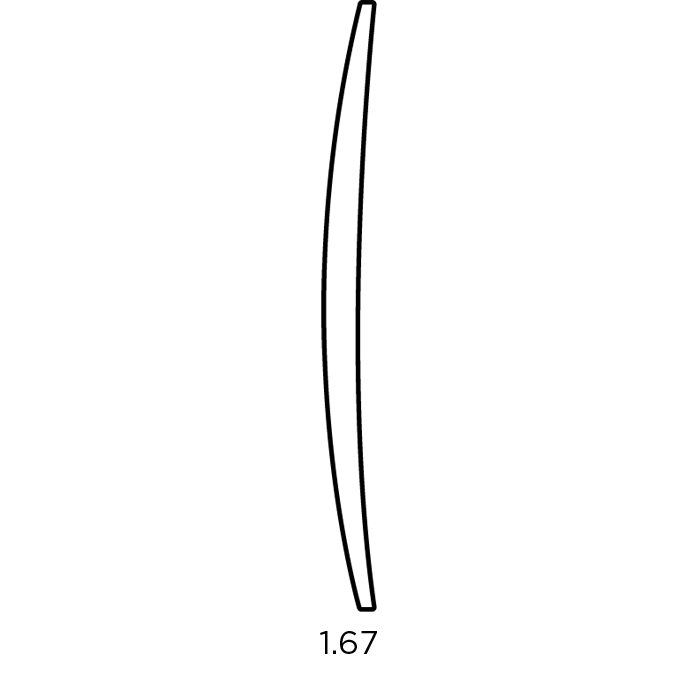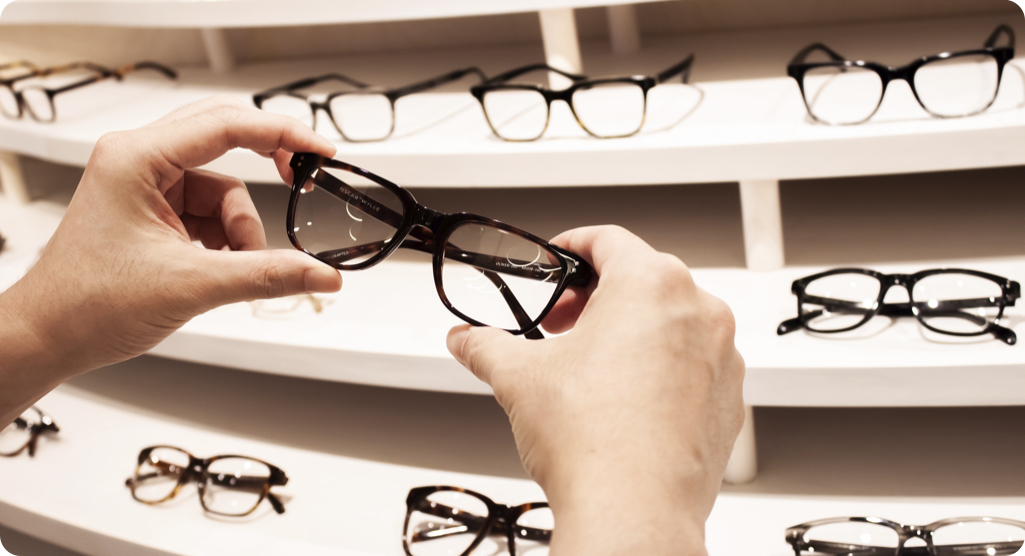

A Guide to High Index Lenses
High index lenses are a type of optical lens that you can choose to have for your glasses. They are lighter and thinner than a standard glasses lens and have many benefits, especially for those with a higher prescription.
We have a range of lenses, including high index lenses, available at Oscar Wylee. Keep reading to find out more on these lenses and how to pick the ones that are right for you.
What are high index lenses?
High index lenses are a type of lens that is thinner and lighter than your standard optical lens. High index lenses are well suited to those who have a high prescription. This is because the higher the prescription, the thicker and heavier a lens is more likely to be. By choosing high index lenses, you can have a strong prescription, with a lens that is more lightweight. Additionally, the quality of vision in the lenses will be better.
Find your nearest Oscar Wylee store and our staff can find your ideal frames.
The Lens Index
To fully comprehend what a high index lens is, it is best to first gain some understanding of what we mean by lens index. A lens index is a group of numbers or values that refers to the ability of a lens to refract light. As light passes through a lens, the lens will refract or bend this light, allowing your eyes to focus clearly.
Generally, the higher the lens index value, the thinner and lighter a lens will be. At Oscar Wylee we provide several indexes for your lenses. The prescription recommendations and lens thicknesses in this article are a general guide. It is advised that you talk to an optometrist or our in-store dispensing staff before buying high index lenses.
High index lenses are available for most lens types, including single vision lenses, bifocal lenses and multifocal lenses, also known as progressive lenses.
1.5 Index Lens
Our standard, entry level lens at Oscar Wylee.
Recommended for prescriptions up to +/- 2.

1.6 Mid Index Lens
Recommended for prescriptions up to +/- 3.

1.67 Index Lens
Recommended for prescriptions up to +/- 4

1.74 Index Lens
Ideal for all prescriptions, but recommended for +/- 4 and above.

The difference between normal lenses and high index lenses.
The difference between normal optical lenses and high index lenses lie in how they are made and how they refract light. Normal lenses, those that sit in the standard range, are often made with plastic and will refract light to help correct vision issues such as nearsightedness (myopia), farsightedness (hyperopia) and astigmatism.
High index lenses work in the same way. However, they are made with a different type of material, often a special, more dense, plastic, that refracts light more efficiently. This means they do not need as much material to do the same job as normal optical lenses.
Polycarbonate lenses vs high index lenses
Polycarbonate is a type of strong, high impact resistant plastic that can be used as a glasses lens. Due to their durability, polycarbonate lenses are often used in children’s glasses, for those who play sports, or engage in other activities where glasses may be prone to breakage.
Polycarbonate is generally not used for high index lenses as, although they are impact resistant and durable, they do not provide as much visual clarity as other materials.
Are all high index lenses aspheric?
When talking about lenses, the term aspheric refers to the profile of the lens, whereas high index refers generally to the thickness. An aspheric lens will have a flatter profile than normal optical lenses, or, in other words, they will not be as spherical. Aspheric lenses will help to reduce eye distortion.
At Oscar Wylee, our high index lenses are also aspheric. Together, a lens that is both high index and aspheric will be thinner and flatter, often more aesthetically pleasing and more comfortable for those with a stronger prescription.
The advantages of high index lenses
When it comes to choosing a high index lens for your glasses, it is good to know what the advantages are, especially compared to normal optical lenses. The advantages include the following:
- Lighter and thinner - High index lenses are lighter and thinner than normal optical glasses, making for a more comfortable wear.
- Clearer, sharper vision - Light has less area to travel through with a high index lens, meaning less distortion and clearer vision.
- Aesthetics - High index lenses reduce the magnification and minification of the eyes, meaning you won’t have that bug eyed look some thicker, stronger lenses can produce.
Disadvantages of high index lenses
Whilst high index lenses may have advantages, especially for those with a high prescription, they also have disadvantages, including the following.
- They can be scratch prone.
- High index lenses may be more expensive than normal lenses.
- They may also be brittle and more prone to breakage.
- High index lenses can be more reflective of light, which may make them harder to use during brightly lit work.
How much do high index lenses cost?
As high index lenses are made with a special material, they often have a higher cost than normal optical lenses. At Oscar Wylee, our high index lenses are priced individually, according to thickness.
You can pick which index you would like when ordering your glasses online or you can come into your nearest Oscar Wylee store and our friendly staff will make sure you get the lens that is right for you.
In addition to high index lenses, we also have a range of other lenses available at Oscar Wylee, from photochromic lenses to prism glasses lenses.
Do I need high index lenses?
If you have a strong prescription and believe you may benefit from high index lenses, come into one of our stores and our friendly staff will discuss the options available to you.
If you do not have an existing prescription but think you may need glasses, book an eye test with our optometrists for a comprehensive evaluation of your eye health.



